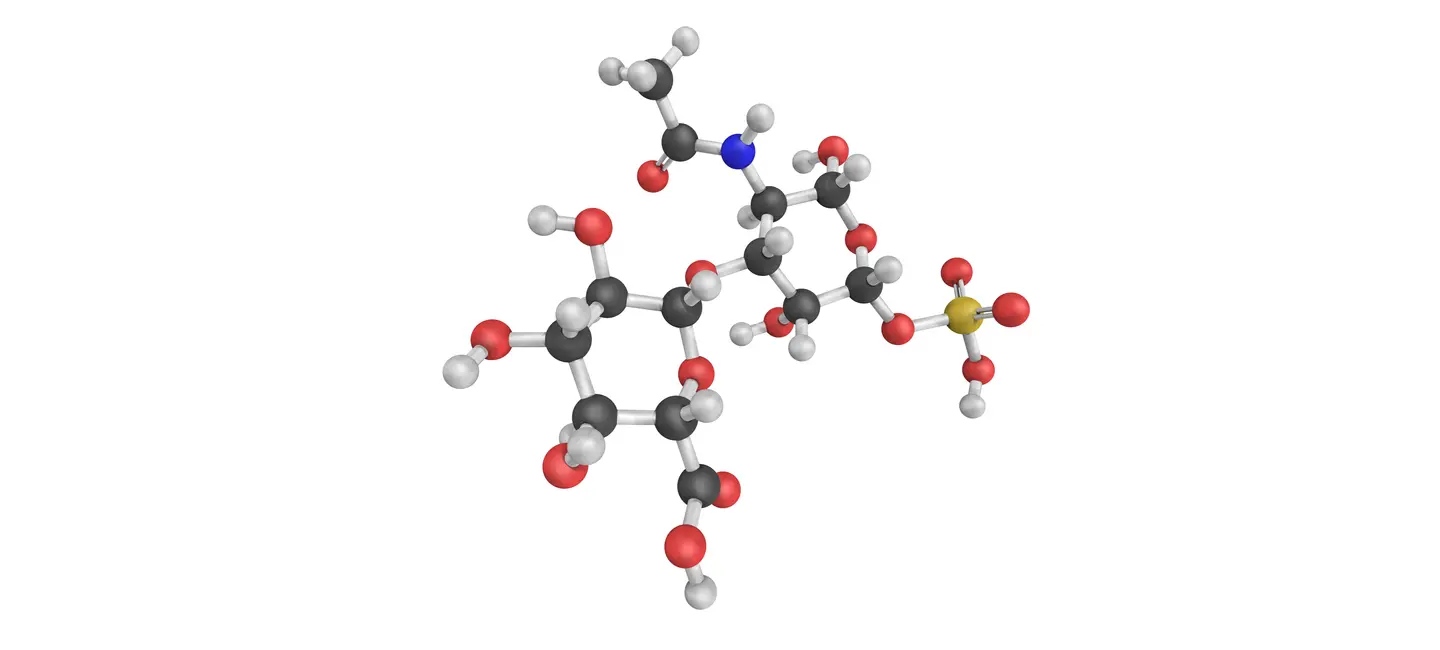
Chondroitin sulfate is a chemical found in human and animal cartilage. It is commonly used by mouth with glucosamine or other ingredients for osteoarthritis.
Chondroitin sulfate is one of the building blocks of cartilage. In osteoarthritis, the cartilage in the joints breaks down. Taking chondroitin sulfate might slow this breakdown. It is usually manufactured from animal sources, such as shark and cow cartilage. It can also be made in a lab.
Chondroitin sulfate is used for osteoarthritis and cataracts. It is often used together with other ingredients, including manganese ascorbate, hyaluronic acid, collagen peptides, or glucosamine. Chondroitin sulfate is also used for many other conditions, but there is no good scientific evidence to support these uses.
Is It Effective?
NatMed Pro rates effectiveness based on scientific evidence according to the following scale: Effective, Likely Effective, Possibly Effective, Possibly Ineffective, Likely Ineffective, Ineffective, and Insufficient Evidence to Rate.
- Cataracts. An injectable solution containing chondroitin sulfate and sodium hyaluronate is approved by the FDA to protect the eye during cataract surgery. It is not clear if using it in a different form will help.
- Osteoarthritis. Taking chondroitin sulfate by mouth seems to provide some relief from osteoarthritis pain and improve function. High quality, pharmaceutical-grade products have shown the most benefit. Chondrosulf (IBSA Institut Biochimique SA), Chondrosan (Bioiberica, S.A.) and Structum (Laboratoires Pierre Fabre) are examples of these products.
There is interest in using chondroitin sulfate for a number of other purposes, but there isn't enough reliable information to say whether it might be helpful.
Is it Safe?
When taken by mouth: Chondroitin sulfate is likely safe when used for up to 6 years. It can cause some mild stomach pain and nausea. Other possible side effects include bloating, diarrhea, and constipation.
When placed into the eye: Chondroitin sulfate is possibly safe when used together with other ingredients in an eye drop.
Special Precautions & Warnings:
Pregnancy and breast-feeding: There isn't enough reliable information to know if chondroitin sulfate is safe to use when pregnant or breast-feeding. Stay on the safe side and avoid use.
Asthma: There is some concern that chondroitin sulfate might make asthma worse. If you have asthma, use chondroitin sulfate cautiously.
Prostate cancer: Early research suggests that chondroitin might cause the spread or recurrence of prostate cancer. This effect has not been shown with chondroitin sulfate supplements. However, until more is known, do not take chondroitin sulfate if you have prostate cancer or are at high risk for developing it (you have a brother or father with prostate cancer).
Warfarin (Coumadin)
Interaction Rating=Moderate Be cautious with this combination.
Warfarin is used to slow blood clotting. There are several reports showing that taking chondroitin with glucosamine increases the effects of warfarin. This can cause bruising and bleeding that can be serious. Don't take chondroitin if you are taking warfarin.
Glucosamine: Taking chondroitin sulfate together with glucosamine hydrochloride might reduce blood levels of glucosamine. But it's not clear if this will change the effects of glucosamine hydrochloride. It's also not clear if this interaction occurs with other forms of glucosamine, such as glucosamine sulfate.
There are no known interactions with foods.
Chondroitin sulfate is most commonly used by adults in doses of 800-1200 mg per day, for up to 2 years.
There is concern that some chondroitin sulfate products are not labeled accurately. Some products might contain no chondroitin, while other products might contain more than the amount stated on the product's label. Because of these issues, the effects of different chondroitin products may vary. Speak with a healthcare provider to find out what dose or product might be best.
Calcium Chondroitin Sulfate, CDS, Chondroitin, Chondroitin Polysulfate, Chondroitin Polysulphate, Chondroitin Sulfate A, Chondroitin Sulfates, Chondroitin Sulfate B, Chondroitin Sulfate C, Chondroitin Sulphates, Chondroitin Sulphate A Sodium, Chondroïtine, Chondroïtine Sulfate A, Chondroïtine Sulfate B, Chondroïtine Sulfate C, Chondroïtine 4-Sulfate, Chondroïtine 4- et 6- Sulfate, Condroitin, CPS, CS, CSA, CSC, GAG, Galactosaminoglucuronoglycan Sulfate, Chondroitin 4-Sulfate, Chondroitin 4- and 6-Sulfate, Poly-(1->3)-N-Aceltyl-2-Amino-2-Deoxy-3-O-Beta-D-Glucopyranurosyl-4-(or 6-), Polysulfate de Chondroïtine, Sulfate de Chondroïtine, Sulfate de Galactosaminoglucuronoglycane, Sulfates de Chondroïtine, Sulfato de Condroitina.
Information on this website is for informational use only and is not intended to replace professional medical advice, diagnosis, or treatment. While evidence-based, it is not guaranteed to be error-free and is not intended to meet any particular user’s needs or requirements or to cover all possible uses, safety concerns, interactions, outcomes, or adverse effects. Always check with your doctor or other medical professional before making healthcare decisions (including taking any medication) and do not delay or disregard seeking medical advice or treatment based on any information displayed on this website.
© TRC Healthcare 2024. All rights reserved. Use and/or distribution is permitted only pursuant to a valid license or other permission from TRC Healthcare.
